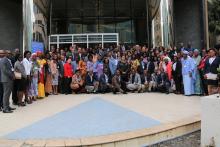Countries strategize their plan on Integrated Community Case Management (iCCM) to end preventable child death
Globally, 5.4 million children under the age of 5 died in 2017. Nearly half of these deaths (2.71 million) occurred in sub-Saharan Africa. Pneumonia, diarrhea and malaria remain the main causes of death among children 2-59 months of age. Since 2012, the World Health Organization (WHO) and UNICEF have recommended the integrated Community Case Management (iCCM) as a key strategy to deliver life-saving interventions for malaria, pneumonia and diarrhea to populations with poor access to health services. iCCM is a component of a comprehensive strategy for integrated management of childhood illness (IMCI), which includes a broader and multi-sector community approach.
Technical experts of WHO, UNICEF, and MOH from 13 high burden countries assembled in Addis Ababa, Ethiopia for a technical consultation and country action planning to end preventable child deaths through heightened iCCM strategy. WHO and UNICEF co-hosted this consultative meeting which was held from 22-26 July 2019, at Elilly International Hotel, in Addis Ababa where representatives of WHO, UNICEF, USAID, BMGF, the Global Fund, the RMNCH Trust Fund, Save the Children, and all other Child Health and Malaria program stake holders took part.
The overall objectives of this meeting were to review the recent learnings related to implementation of integrated community case management of childhood illness; define guiding principles and develop recommendations for embedding iCCM within community health systems as core to Primary Health Care system; identify needs and gaps around sustainable financing of iCCM; and review progress, key bottlenecks and priorities to update national iCCM implementation plans in the context of recent learning to guide the High Burden to High Impact response and broader child health programming, as well as Global Fund applications and other resource mobilization efforts.
Dr Abraham Tariku, Child Health Coordinator from Maternal and Child Health directorate of Ministry of Health Ethiopia welcomed the global experts on Health Minster’s behalf for attending this important meeting that intends for the health of children. Dr. Abraham speaking on the welcome speech underlined that countries need to sustain improvements in child health by investing in the health of new-borns, infants and children.
Dr. Aggrey Kaijuka Bategereza, WHO Representative to Ethiopia speaking on the opening highlighted that the iCCM has a much broader impact on mortality reduction and has shown to be an effective strategy for increasing correct malaria treatment, especially for reaching the poorest and most marginalized communities. He also added that, Ethiopia has scaled up iCCM through Health Extension Program in all regions of the country. Dr Aggrey added that, “Despite all efforts, experience with large-scale implementation of iCCM remains limited for several reasons and there are challenges faced by countries in implementing iCCM hence hopefully recommendations will be developed on this meeting for addressing these challenges.”
The technical consultation was held from day 1-3 and as a result, a set of recommendations were developed for institutionalizing iCCM within the broader community health systems and countries’ child health policies and programmes. Likewise, the national iCCM implementation plans have been also reviewed by the respective country teams on day 4 and 5 to inform High Burden High Impact response.
For further information or interview:
Technical contact
Dr. Salim Sadruddin, sadruddins [at] who.int
Dr. Wegen Shirka, shirkaw [at] who.int
Dr.Worku Bekele, workub [at] who.int
Media contact
Selamawit Yilma, yilmas [at] who.int
For further information or interview:
Technical contact
Dr. Salim Sadruddin, sadruddins [at] who.int
Dr. Wegen Shirka, shirkaw [at] who.int
Dr.Worku Bekele, workub [at] who.int
Media contact
Selamawit Yilma, yilmas [at] who.int
